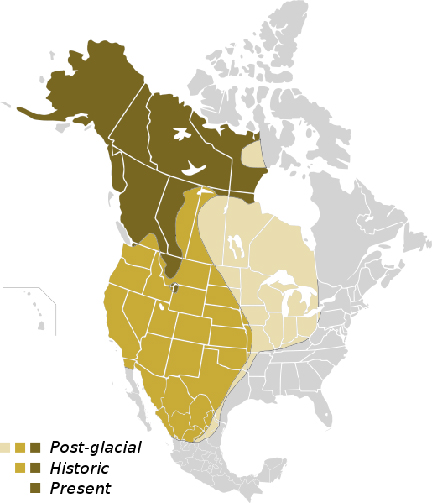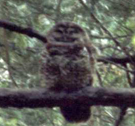Judge “Grizzly” Molloy Scares Humans
U.S. District Judge Donald Molloy has banned aerial weed spraying on the Kootenai National Forest because the helicopters might scare grizzly bears.
The poor, frightened grizzly bears might be driven from their habitat according to the judge.
Judge nixes aerial weed spraying on Kootenai
By MATT VOLZ, helenair.com, April 8, 2010 [here]
A U.S. Forest Service plan to spray herbicide from helicopters over the Kootenai National Forest does not adequately protect dozens of grizzly bears and could drive them from their habitat, a federal judge has ruled.
U.S. District Judge Donald Molloy concluded the federal agency can’t conduct any aerial spraying in the 2.2-million acre forest in Montana’s northwestern corner until it addresses in its plan how often the flights would be allowed and what the effect would be on the endangered bears.
The Alliance for the Wild Rockies, a Helena-based environmental group, sued the Forest Service over the plan, saying multiple fly-overs would cause the bears to flee and permanently abandon any habitat that is subject to weed spraying.
“When the low-flying helicopters fly over grizzly habit, the grizzlies leave,” said Michael Garrity, executive director of the group. “They can’t just fly helicopters over endangered species habitat without looking at the effects on the endangered species.”
Molloy, affirming a magistrate judge’s earlier recommendations, sent the plan back to the Forest Service, saying the agency’s conclusion that low-altitude, high-frequency flights are not likely to adversely affect the grizzly bear was “arbitrary and capricious.”
Other aspects of the plan, including ground application of the herbicides, can go forward, Molloy said in the March 30 ruling.
The environmental group also claimed in the lawsuit that the chemical used in the herbicide could be harmful to animals and to people living in the Libby area, but the judge ruled for the Forest Service in those claims. … [more]
Judge Molloy also thinks grizzly bears are going extinct due to global warming [here].
We have a serious problem when Federal judges adopt pseuodscience mythologies and prescribe wildlife management from the bench. Crackpot theories are okay when held by crackpots without dictatorial powers, but when Federal judges pretend to know something about wildlife, they really muck things up.
How about wildfires, Judge Molloy? Shall the USFS stop fighting forest fires in “grizzly habitat” because those firefighting helicopters “scare the bears”?
What is grizzly bear habitat anyway? Historically the species has ranged across most of North America. From Wikipedia [here]:

Distribution of grizzly bears during post-glacial, historic and present time
What can we ascertain from this map?
First, grizzly bears moved south from Beringia around 13,000 years ago when the continental ice sheets of the Wisconsin Glaciation melted. They are newcomers. Human beings preceded grizzly bears in most of North America.
Second, grizzly bears are adaptable to many habitats. They are not dependent on whitebark pine nuts as Judge Molloy ruled last September, since across most of their historical and current range there are no whitebark pines. Grizzly bears are omnivores and will eat just about anything, including garbage.
Third, grizzly bears are not heat-sensitive or restricted to any particular climate. They ranged from Mexico to Alaska, from the California coast to Pennsylvania. “Climate change”, that pseudoscientific hoax/scam/lie, would not faze grizzly bears even if it were real.
Fourth, according to Wikipedia [here] there are currently about 55,000 wild grizzly bears located throughout North America. They are not on the verge of extinction.
Fifth, grizzly bears are not easily frightened, even by helicopters. They are aggressive and fearless creatures. This fact is well-known and supported by much evidence. From Wikipedia:
Aversive conditioning, a method involving using deterrents such as rubber bullets, foul-tasting chemicals or acoustic devices to teach bears to associate humans with negative experiences, is ineffectual when bears have already learned to positively associate humans with food. Such bears often have to be translocated or destroyed because they pose a threat to humans. The B.C. government destroys approximately 50 problem bears each year and overall spends more than one million dollars annually to address bear complaints, relocate bears and destroy them.
The poor, endangered, easily frighten grizzly bear myth is pernicious, which means it is capable of causing great harm, destruction, or death.
Nutzoid judges who haven’t got a clue in a crabshack about wildlife reality and whose rulings are based on pernicious myth end up causing great harm, destruction, or death.
Judge Molloy is deadly. He has gone lunatic feral and represents a risk to life and limb. He is aggressive and dangerous, prone to attacking humans, destructive of property, and very capable of inflicting physical and sometimes fatal harm to people.
Traveling in groups of six or more can significantly reduce the chance of judge-related injuries while hiking in judge country. We recommend that everyone who enters judge country be required to carry judge spray. For judge-country campers, hanging food between trees at a height unreachable to judges is a common procedure, although some judges can climb and reach hanging food in other ways. An alternative to hanging food is to use a judge canister.
Increased human-judge interaction has created ‘problem judges’, which are judges that have become adapted to human activities or habitat. Any judge that is conditioned to finding food around campsites will almost always return and expect the same reward. The judge is then a threat to campers and itself, and park rangers may be forced to dispatch it.
by YPmule

Posting to the YPTimes.